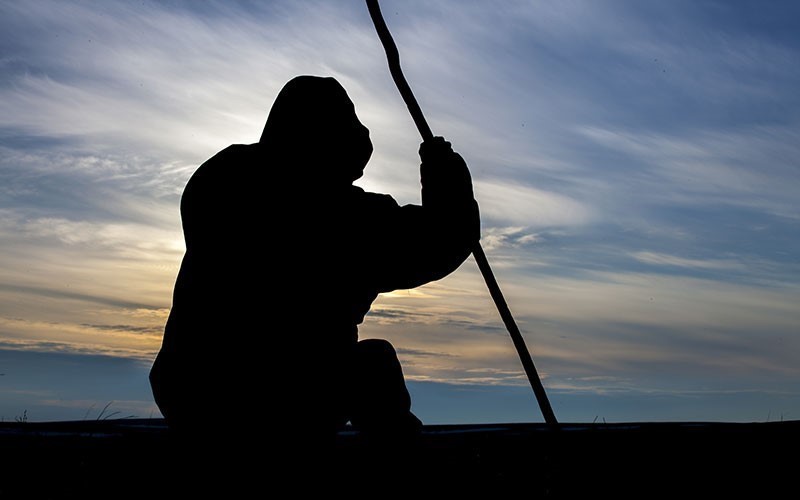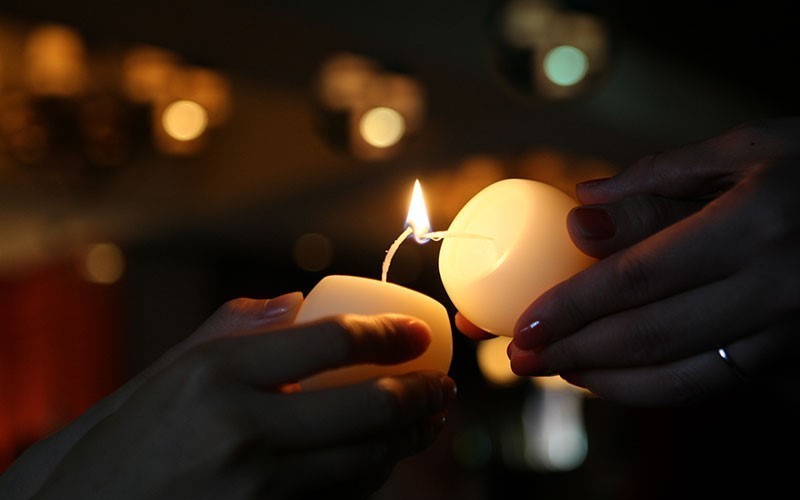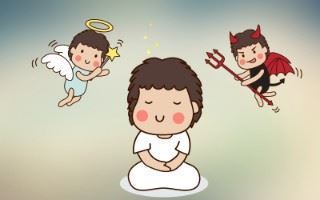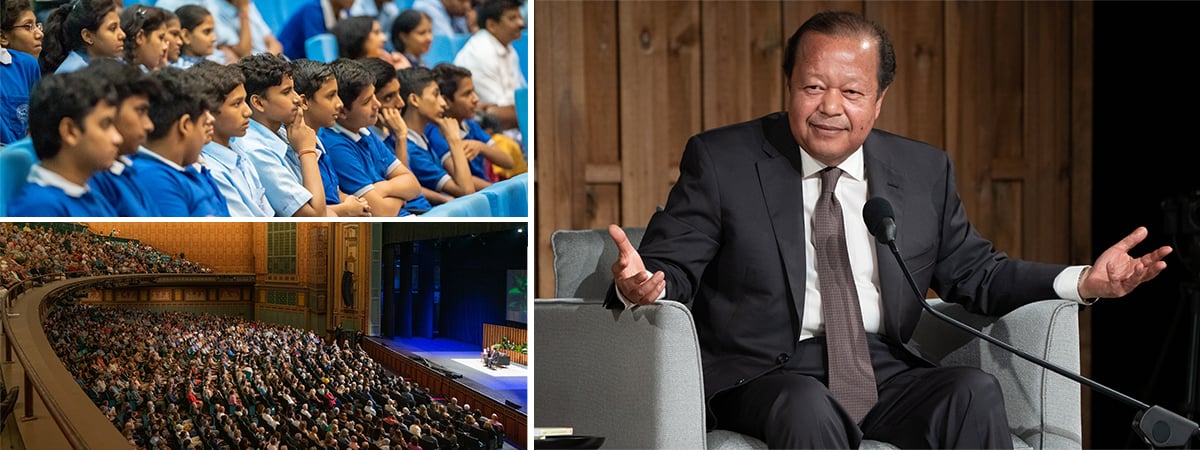Topics
 00:07:05
Sword of Forgiveness
Video
Duration : 00:07:05
Forgiveness is to sever the relationship with an action that is dragging you dow...
00:07:05
Sword of Forgiveness
Video
Duration : 00:07:05
Forgiveness is to sever the relationship with an action that is dragging you dow...
MC: [Graeme Richards]
One of the questions that was posed is, “If forgiveness is difficult for you to begin with—forgiving someone else is hard enough—turning it inward to the person that you know better than anyone else, the person that you probably judge more than anyone else—how do you forgive yourself?”
Prem Rawat:
Well, that’s a wonderful question. Because that is so important, to be able to forgive yourself. And let’s just not even bring “you and somebody else” into the picture. Let’s just talk about forgiveness, what “forgiveness” is.
And a lot of people think “Forgiveness is granting license to mediocrity, granting license to somebody’s mistake.” That is not forgiveness. “Forgiveness” is to sever the relationship with that action that is dragging you down.
So, now, whatever—and, you know, somebody did something to you that was terrible. And that happened a long time ago. But, that person still has a clutch on you. They still have a clutch on you. Because every day that you wake up, perhaps, and in a solitary moment, you curse that person; you think of that person; that person is still connected to you.
And forgiveness is saying, “No more. You will not have control over me. I want my life back. I want my life back, and I do not authorize you, any more, to haunt me.” That’s what forgiveness is.
So, it’s not going around saying, “Oh, yeah, I, I, I know you, you....” I mean, uh! And this is the way I see it. This is the way I see it. I mean, one time a horrible thing happened to me. And then, every time I would think about it, it was like, “Oh, my God, oh, my God, oh, my God.”
And then I just said, “You know, that little punk still has control over me. And I’m not even in his country anymore. And I’m not going to let him have control over me.” And I said, “That’s it. Gone!”
That’s what forgiveness is. Forgiveness is very powerful. It’s really saying, “No, I’ve got my life. Thank you very much.”
Regaining—it’s regaining. Because, if you don’t, then the clutches will still be there. And what it does to you—what this clutching does to you, these claws that are buried inside of you, to infuriate you—it causes anger; it causes fear; it causes you to shut down; it causes you to stop moving forward; it stops appreciation.
And you live in fear. You live in fear! And that person is gone, but the clutches are still there. And it’s saying, “No more, thank you!”
And when you start to look at forgiveness that way, it takes on a whole different meaning. Because, up till now it’s been, it’s like, “Oh, uh, I, I forgive you, and you know, it’s okay. Eh, and you did this to me, and it’s like....”
But you know, there are things that can happen to you in this life that, if you are talking about acceptance of somebody’s actions, it’s not going to happen. It’s just not going to happen! Because you cannot accept some of those actions. They are so heinous!
And you cannot allow yourself to be a victim. Some of the things, you will never be able to say, “Oh, yeah, I’m fine with that.” But! It’s up to you whether you allow the talons of that person and that activity still to be gripping you. Because if you don’t, then use the sword of forgiveness and free yourself. You move on.
So that’s how I see forgiveness. Not saying, “Oh, yeah, okay, you did this.” Because, some of the actions are so heinous! And you see that. You see that happening, so many places.
Another way to understand this is, one day Buddha was out walking, and all these people were saying very bad things about him. So his disciple who was with him came back, and he said, “Buddha, all those people were doing terrible things, saying terrible things to you. Aren’t you affected by that?”
And Buddha said, “Okay, well, see this bowl? Whose bowl is it?” It was Buddha’s bowl. And he said, “Yeah, it’s your bowl!” So then he took the bowl and he scooted it towards his disciple a little bit. He says, “Whose bowl is it now?” The disciple said, “It’s still your bowl.” He scooted it a little closer. “And whose bowl is it now?” Scooted it in a little closer. “Whose bowl is it now?”
He kept going like that, and then finally he took the bowl and put it in his disciple’s lap. He said, “Whose bowl is it now?” He says, “Buddha, it’s still your bowl.” He said, “Exactly. Exactly! I don’t have to accept this. The day I do, it becomes my bowl. But if I don’t, it’s still theirs.”
You know, and I understand—I mean, sometimes these stories are easier said than actually translated into your life, but at least, if you begin to chisel away....
I mean, maybe the rope is so thick that you won’t be able to cut it in one day. But at least, you start severing it, start understanding the dynamics—that you have the power to sever that rope, that this is what forgiveness means.... That, ultimately one day you will weaken that rope; that it will, it’ll be severed.
But you need to begin. You need to start understanding that.
- Prem Rawat
 00:03:03
Winter is Coming
Video
Duration : 00:03:03
If you want to experience today, then remove yesterday and tomorrow.
00:03:03
Winter is Coming
Video
Duration : 00:03:03
If you want to experience today, then remove yesterday and tomorrow.
There was an aborigine tribe in Australia. And one day the tribespeople got together with the chief and said, “Chief, the winter is coming. Is it going to be a really cold winter?” And the chief said, “Okay, I’ll have an answer for you in a few days.”
So he goes, finds a phone, calls up the Met Office and says, “Is it going to be a cold winter?” And the Met Office said, “Oh, yes, it’s going to be a cold winter, we think.” He comes back, says, “Oh, it’s definitely going to be a cold winter, and you’d all better start collecting wood, so you can light the fires and stay warm.” So they all go out and they collect wood.
A few weeks later, as they have been collecting wood, they go back to the chief, and they say, “Chief, how cold is it going to be?” The chief says, “I’ll get back to you.”
He calls up the Met Office, and he says, “And how cold is it going...?” He says, “It’s going to be really cold. It’s going to be really cold.” So he tells all the tribes, “Well, you better go collect more wood! It’s going to be really, really cold!”
A few weeks later the crowd gets together again, “Chief, really, exactly how cold is it going to be?” This chief calls up the Met Office, “So, how cold is it going to be?” The Met Office says, “We don’t really know exactly how cold it’s going to be. But every time we see through the satellite the aborigines collecting the wood, we know it’s going to be really cold.”
So, one triggers the other! One is going for the other. And this is what happens in our lives.
Because, if you want to begin to understand what hope is, you have to begin to start to understand what “today” is. Now, how do you understand today!?
So, if you want to experience “today,” then from today, remove yesterday and tomorrow, and you will be left with today. And you will find that today is more profound that you ever imagined.
- Prem Rawat
 00:02:01
Keep Lighting the World
Audio
Duration : 00:02:01
The most beautiful news is this: “It doesn’t have to be created. Peace is alread...
00:02:01
Keep Lighting the World
Audio
Duration : 00:02:01
The most beautiful news is this: “It doesn’t have to be created. Peace is alread...
Have you seen those plastic candles—those digital plastic candles; they’re about this big, and you just have an on-off switch; you can just put it.... When I first saw that, I said, “This is it! This is great! No fire danger. No problem. Want candle, just turn this on....” And now they even flicker, and they do everything.
But then I said to myself, “There is something that a candle does, that this can never do.” Do you know what it is? A candle that is lit, can light another unlit candle. This digital candle can never do that.
You as a human being, if you are a lit candle, you can light another candle. Maybe peace is not that impossible. Maybe peace is not that difficult—if we can change our way of looking at peace. Because the most beautiful news is this: “It doesn’t have to be created. Peace is already there.”
If it had to be created, then we have truly a very big challenge afoot. The good news is, peace doesn’t have to be created—it is dancing in the heart of every single human being, regardless of religion, regardless of race, regardless of color, regardless of whether they are rich, whether they are poor, whether they’re educated, whether they are uneducated—whatever the circumstances may be, the peace is dancing in the heart of every single human being.
It’s here. Peace, my friends, has to be discovered! Not created. And that’s the peace that’s going to make the difference.
– Prem Rawat
 00:01:04
Forgiveness
Audio
Duration : 00:01:04
The day you decide to move on. That’s forgiveness.
00:01:04
Forgiveness
Audio
Duration : 00:01:04
The day you decide to move on. That’s forgiveness.
Forgiveness doesn’t mean accepting mediocrity, accepting the other person’s mistake. That’s not forgiveness. You know what forgiveness is?
The day you decide to move on. That’s forgiveness. You’re not going to be victimized by this person’s actions, but you want to move on—no more struggle, no more fighting.
When two things oppose each other, that’s a struggle. “Struggle”—because that person still has their hooks in you. And you’re trying to break free, and you’re not able to.
Forgiveness is the day you say, “No. I’m not going to have the struggle. I want to move on.” This is your strength. This is your real strength. And that’s the day you have forgiven. That’s the day you have forgiven.
– Prem Rawat
 00:03:40
Winning the War
Audio
Duration : 00:03:40
Joy is your need, has been your need, and will be your need.
00:03:40
Winning the War
Audio
Duration : 00:03:40
Joy is your need, has been your need, and will be your need.
People say, “Are you an inspirational speaker?” and I say, “Nope.” Because sometimes, what I say, people don’t like. But I say it.
I don’t know where a human heart exactly is, but I know what lives there. And in the human heart lives the courage, lives the clarity, lives the understanding, lives the joy—and lives the Divine.
Joy is your need, has been your need, and will be your need. Peace has been your need and will be your need. War is what is wrong with the society, wrong with the people, not right with the people. Peace is what is right for the societies, right for the people. And no matter how many changes we go through, these things hold their own value; they are true.
So! You are interested in winning your battles—and I am not interested in telling you how to win your battles, because I don’t care about the battles. For me, it is perfectly okay if you lose a few. Lose a few battles and don’t feel bad! Don’t feel bad! But, don’t lose the war. Don’t lose the war.
Battles, you win some, lose some, no problem. Don’t lose the war. You’ve got to win the war! And the war where the good is victorious over the bad—the good, that generosity, is victorious over the greed, compassion is victorious over hate, knowledge is victorious over ignorance, joy is victorious over sadness—that’s winning the war.
The challenge for mankind is to be interested in peace—and it’s a challenge! Is it possible? Of course! No question about it. Because I have hope that each one of you has the possibility in your lives to encourage all that is good, and to be victorious in this battlefield, not by winning all the battles, but by winning the war. I know this is possible.
– Prem Rawat
 00:02:05
The Reward of Hope
Audio
Duration : 00:02:05
But what is the reward of hope? It brings you more hope.
00:02:05
The Reward of Hope
Audio
Duration : 00:02:05
But what is the reward of hope? It brings you more hope.
It takes courage to have hope. Many people in their lives, they see things not going their way; they start losing hope—and the next thing you know, calamity.
But it takes courage to have hope; it takes courage to have clarity. And when there is that courage, (ha!) this is what’s beautiful.
If you get angry, you know what you will be rewarded by? Anger. Just think about it, right? You get angry, you’ll be rewarded by anger. What is the reward of anger? Either you will get more angry.... Maybe you begin by being angry with your friend, and the next thing you know, you’re also angry with yourself, for being angry at your friend.
Anger rewards anger. Anger begets anger. Fear rewards fear—you get afraid of being afraid. And that’s when it really sets in. It’s more than the boogeyman in the closet. Now you’re afraid to be in the room; you’re afraid to be alive. “Oh my God....”
But what is the reward of hope? It brings you more hope. What is the reward of joy? It brings you more joy. What is the reward of happiness? It brings you more happiness. What is the reward of knowledge? It brings you more knowledge.
What is the reward of being content? It brings you more contentment. What is the reward of knowing? It brings you more knowing. This is how it is.
– Prem Rawat





